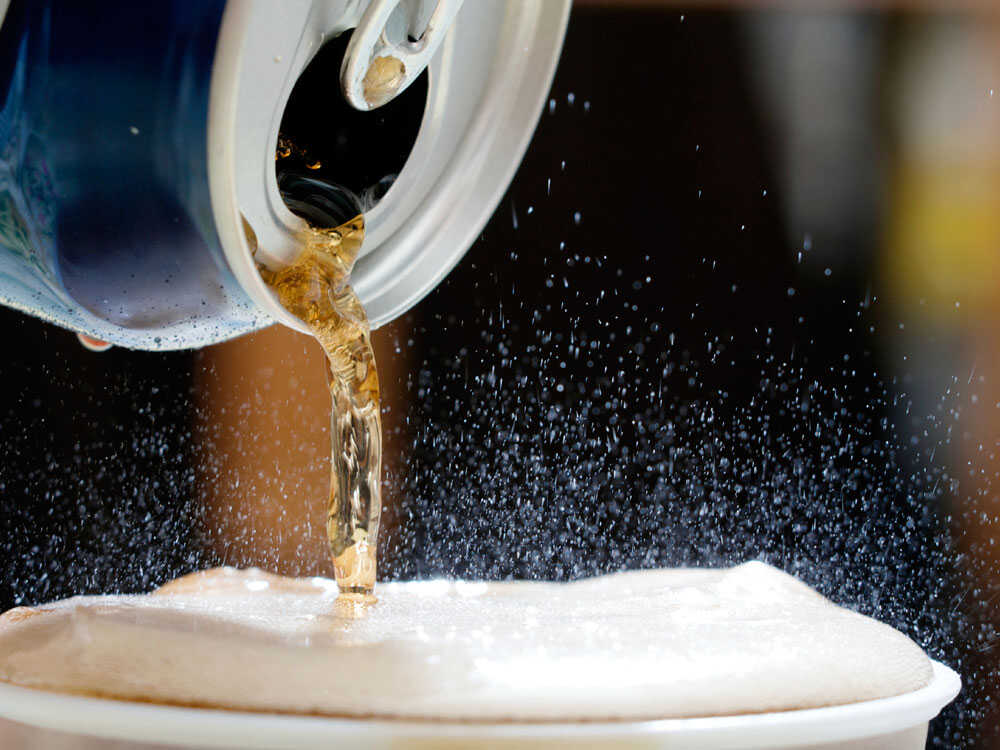What Animals Are Unable To Handle Carbonation

Every time y'all scissure open a soda, your taste buds may assistance you get the full feel of the carbonated beverage. Arthur Carlo Franco/iStockphoto.com hide caption
toggle caption
Arthur Carlo Franco/iStockphoto.com

Every fourth dimension you crack open a soda, your taste buds may assistance you go the full experience of the carbonated drinkable.
Arthur Carlo Franco/iStockphoto.com
Every time you lot crevice open a soda and enjoy a bubbly concoction, you tin thank your natural language's sour-sensing cells for helping you lot get the full experience of a carbonated beverage.
That'due south because a new report shows that cells in taste buds that answer to sour stimuli also seem to exist the ones responsible for tasting the carbonation's fizz.
"When you lot drink a carbonated drink, yous really think that y'all're detecting the bubbling bursting on your tongue, don't you?" says Nicholas Ryba, a senior investigator at the National Institutes of Health in Bethesda, Doc.
Merely Ryba notes that when people drinkable carbonated beverages in pressure level chambers set upwards to proceed the bubbles from forming, "the sensation y'all get is actually the aforementioned." That suggests the effect comes not from the bursting bubbling, merely the carbon dioxide itself.
A Taste Test For Mice
To find out how the taste organization responds to carbon dioxide, Ryba's lab collaborated with the lab of Charles Zuker, a researcher now at Columbia University in New York. Together, the scientists had previously identified receptor cells for sweet, bitter and sour, and a savory taste called umami.
By monitoring the activity of a nervus that carries signals from taste receptor cells in the tongue, the team looked at the carbon dioxide response in strains of mice that had been genetically engineered to lack cells needed to sense specific tastes. "In our previous work, we've generated a number of genetic lines of mice that are missing cells required for particular gustation qualities," Ryba says.
They found that mice without sour-sensing cells did not respond to the carbonation. Merely mice that lacked other sense of taste-sensing cells, like sweet-sensing cells or umami-sensing cells, were still able to react to carbon dioxide usually.
"It's really clear that cells that mediate sour also are required for the gustatory modality of carbonation," Ryba says.
Cells With Carbonation-Detecting Coatings
What'south more, the researchers found that sour-sensing cells have a certain enzyme on their surfaces, according to a report on the research in the journal Science. This enzyme, carbonic anhydrase 4, belongs to a family of enzymes that respond to carbon dioxide.
"This is a particularly interesting carbonic anhydrase. It's actually stuck on the exterior surface of cells," says Ryba, who says it appears to cause a reaction with carbon dioxide that generates acidity just outside the sour-sensing cells. "That's why we think carbon dioxide causes a gustatory modality response."
Earl Carstens of the University of California, Davis, who has studied the perception of carbonation, says that when he drinks soda, he normally thinks nearly the tingling and burning awareness that's slightly pleasant at the back of the throat — feelings he says are acquired by carbonic acid triggering sensory pathways that register things similar hurting.
"Merely this paper says there'southward also a distinctive gustatory modality component that you should be aware of, too," Carstens says. "And it'due south distinctly different from only regular water."
Carstens says that he and other researchers have long known that the carbonic anhydrase enzyme must somehow be involved in the enjoyment of carbonation, considering mount climbers who take altitude-sickness drugs that block this enzyme have reported that champagne and other bubbly beverages gustation similar dishwater.
The Big Business Of Tiny Bubbling
It'due south unclear why animals adult the ability to sense carbonation. It may take evolved to help them detect fermentation in foods. Or, it could just be a serendipitous byproduct of a system set to aid regulate the pH residuum of cells in the taste buds.
Regardless of how the tongue developed its ability to detect carbonation's special taste, that gustation might assistance explain why carbonated beverages are such big business.
"Soft drinks are actually the most consumed beverage in the U.S.," says John Sicher, editor and publisher of Beverage Digest, a magazine that covers the global nonalcoholic beverage business organization. "Americans spend near $73 billion a year on sodas," he said.
The average American drinks about 760 8-ounce servings each twelvemonth, or roughly two carbonated beverages a day, says Sicher. Simply he adds that consumption of soda has been decreasing in recent years, as people increasingly choose bottled water.
Source: https://www.npr.org/2009/10/15/113831763/study-when-soda-fizzes-your-tongue-tastes-it
Posted by: fierropornat.blogspot.com

0 Response to "What Animals Are Unable To Handle Carbonation"
Post a Comment